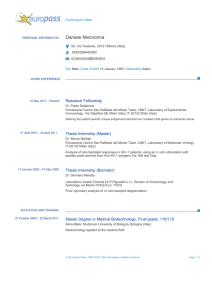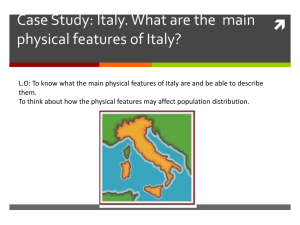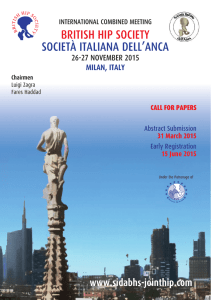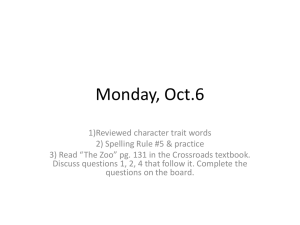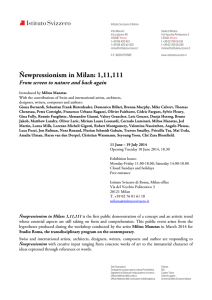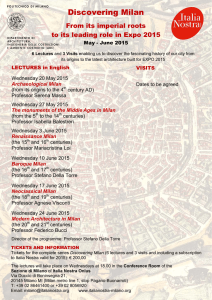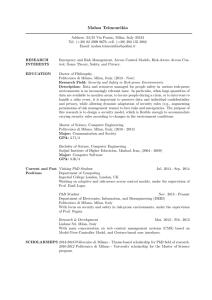CSE approach to connections design (pdf, 2014)
advertisement
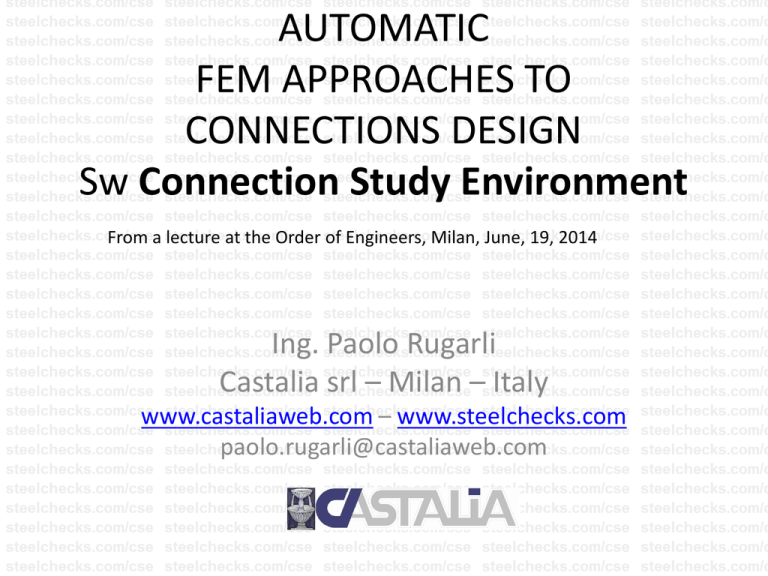
AUTOMATIC FEM APPROACHES TO CONNECTIONS DESIGN Sw Connection Study Environment From a lecture at the Order of Engineers, Milan, June, 19, 2014 Ing. Paolo Rugarli Castalia srl – Milan – Italy www.castaliaweb.com – www.steelchecks.com paolo.rugarli@castaliaweb.com Connections • This is a quite complex field. • It has been over simplified due to its high complexity. • Many structural failures are due to unproper connection design. • I dare say this is today the less enhanced field of structural analysis. • People want cooking recipes, but they use them far beyond their limits of applicability. • Connection design is seen as a poor activity. • Enormous money savings can be got by a more advanced connection design. Bridge gusset plate buckling failure. FINITE ELEMENT SIMULATION AND ASSESSMENT OF THE STRENGTH BEHAVIOR OF RIVETED AND BOLTED GUSSET-PLATE CONNECTIONS IN STEEL TRUSS BRIDGES FINAL REPORT Georgia Southern University, Statesboro, GA, March 2013 Ing. Paolo Rugarli - Castalia srl - Milan - Italy - www.castaliaweb.com - www.steelchecks.com 2 Some preliminary considerations • • • • • This work started in 1999, with the aim to fully cover connection design, i.e. to find a general approach (also to welded connections). During these years I have worked at this problem alone, so this is a personal view. I do not agree with currently used approaches and I felt free to search for a different path. However, there is an increasing number of colleagues, in several Countries all around the world, agreeing that the automatic FEM approach is the future of connection design I am one of them. Research is not finished. Several aspectes have to be improved. However, automatic fem modeling and checking of connections is already available. Ing. Paolo Rugarli - Castalia srl - Milan - Italy - www.castaliaweb.com - www.steelchecks.com 3 Acknowledgements • • • • Research funds got by Italian Agencies: 0€ Cooperation with Italian University: none European funds for innovative research: 0€ But… this research has been made in Italy, at Milan Bramante’s S. Maria delle Grazie Milan, Italy (1492-1497) Ing. Paolo Rugarli - Castalia srl - Milan - Italy - www.castaliaweb.com - www.steelchecks.com 4 Why FEM? • NOT to be “precise”. In connection design “preciseness” just does not exist (friction, gaps, lack of planarity, prying forces, plasticity, geometric effects, imperfections…). • NOT to have 4 significant digits results, then. • NOT to waste time • NOT to have useless complexity • NOT to stay hours waiting for results Ing. Paolo Rugarli - Castalia srl - Milan - Italy - www.castaliaweb.com - www.steelchecks.com 5 Why FEM ? (2) • Because FEM is general. • Because FEM can be automated. • Because a Von Mises stress map… speaks • Because many errors are due to neglecting important forces components. • Because many errors are due to improper additional moment computations • Because traditional means are too coarse. • Because connection design is still a bottle-neck Ing. Paolo Rugarli - Castalia srl - Milan - Italy - www.castaliaweb.com - www.steelchecks.com 6 The problem • Given a generic “scene” like this…. Courtesy: Ing. Alborghetti – Rovato (Italy) Ing. Paolo Rugarli - Castalia srl - Milan - Italy - www.castaliaweb.com - www.steelchecks.com 7 Or these… Courtesy SZF (Italy) Courtesy: CEN, Bochum, Germany Courtesy: Ing. Bagnasco (Italy) Courtesy: ing. Galluzzi (Florence – Italy) Ing. Paolo Rugarli - Castalia srl - Milan - Italy - www.castaliaweb.com - www.steelchecks.com 8 Or again like these… And assumed known the internal forces at the extremities of the fem elements defining the members, or at the extremities of the members (as 3d objects) connecting at the node…… We would like to automatically find…. Ing. Paolo Rugarli - Castalia srl - Milan - Italy - www.castaliaweb.com - www.steelchecks.com 9 1.The forces flowing in each component. 2.If the joiners are able to transfer those forces. 3.If these forces are below or above the “limit” of the components (keeping into account: resistance, stability and fatigue issues). 4.A reasonable amount for the displacements. 5.A reasonable estimate for the stiffnesses. “Reasonable” means: SOUND from an ENGINEERING VIEW POINT Ing. Paolo Rugarli - Castalia srl - Milan - Italy - www.castaliaweb.com - www.steelchecks.com 10 How setting forces at extremities (1) From BFEM (possibly “squeezed” to 24 worst combi/member) BFEM=standard fem model for design, “Bernoulli” FEM Notionally, usung (fraction of) elastic limits or plastic limits (overstrength), or “defined” values Pasting a table of data Ing. Paolo Rugarli - Castalia srl - Milan - Italy - www.castaliaweb.com www.steelchecks.com 11 How setting forces at extremities (2) Direct setting of table values And then…. Ing. Paolo Rugarli - Castalia srl - Milan - Italy - www.castaliaweb.com www.steelchecks.com 12 A flower opening…. Ing. Paolo Rugarli - Castalia srl - Milan - Italy - www.castaliaweb.com www.steelchecks.com 13 A glance at the past…. Once upon a time, Engineers did compute structural layouts by means of graphical tools. It was not even possible to imagine that a structure like this… Courtesy: Walley Design – Olgiate Olona - VA Could be checked by a fem model. I AM NOT MEANING THAT THE ENGINEER IS NOT NEEDED I MEAN WE NEED SKILLED ENGINEERS Ing. Paolo Rugarli - Castalia srl - Milan - Italy - www.castaliaweb.com - www.steelchecks.com 14 So now when I say that a “node” like this… Can be computed automatically (by properly choosing pertinent options), some colleagues are surprised. But, indeed, it can. YES WE CAN Ing. Paolo Rugarli - Castalia srl - Milan - Italy - www.castaliaweb.com - www.steelchecks.com 15 We can solve every “scene” no matter how complex, irregular or crazy Ing. Paolo Rugarli - Castalia srl - Milan - Italy - www.castaliaweb.com www.steelchecks.com 16 How can we do that? The answer is… Via FEM ANALYSES When I started the work I was not even thinking about FEM. FEM turned out to be necessary after the problem had been analyzed in detail. Ing. Paolo Rugarli - Castalia srl - Milan - Italy - www.castaliaweb.com - www.steelchecks.com 17 Remember: • NOT to be “precise”. In connection design “preciseness” just does not exist (friction, gaps, lack of planarity, prying forces, plasticity, geometric effects, imperfections…). • NOT to have 4 significant digits results, then. • NOT to waste time • NOT to have useless complexity • NOT to stay hours waiting for results Ing. Paolo Rugarli - Castalia srl - Milan - Italy - www.castaliaweb.com - www.steelchecks.com 18 Step 1 • A standard finite element model of a whole structure or just of the members meeting at a fem node, is created (BFEM). Courtesy: Jean Nouvel Architects Courtesy: Studio Ing. Galluzzi, Florence Ing. Paolo Rugarli - Castalia srl - Milan - Italy - www.castaliaweb.com - www.steelchecks.com 19 Step 2 • Equal jnodes recognition C.S.E. Node : node in the fem model meaning Jnode: wireframe information related to memebrs meeting at a node (also jclass) Renode: one way to construct jnode in 3D. Renode= scene + settings Prenode: a parameterized real node New necessary terminology, not a joke! (this is a top complexity level example) Ing. Paolo Rugarli - Castalia srl - Milan - Italy - www.castaliaweb.com - www.steelchecks.com 20 A much simpler case… Ing. Paolo Rugarli - Castalia srl - Milan - Italy - www.castaliaweb.com www.steelchecks.com 21 JNODE ANALYTICS Jnodes can be: •Free •Central •Hierarchical •Cuspidal •Tangent •Constrained •Simple •Multiple (see above) Hierarchical = one “master”, one or more “slaves” -> most part of jnodes The “connection code” applied to beam elts allows automatic detecting… Ing. Paolo Rugarli - Castalia srl - Milan - Italy - www.castaliaweb.com - www.steelchecks.com 22 Step 3 • Jnode selection and construction of Renode (scene creation) Courtesy Ing. Galluzzi, Florence Ing. Paolo Rugarli - Castalia srl - Milan - Italy - www.castaliaweb.com - www.steelchecks.com 23 C.S.E. MDI interface Initially members overlap. Ing. Paolo Rugarli - Castalia srl - Milan - Italy - www.castaliaweb.com www.steelchecks.com 24 • Scene creation prepared in such a way to automatically detect connections once proper geometrical rules are set up. • These geometrical rules rely on surface contact, i.e. equal planes opposite normals recognition. • The solids are modeled via (planar) B-REP, boundary representation. • Once a component is B-REP defined it can receive “working process” and is no longer what initially was. C.S.E.: adding a component Ing. Paolo Rugarli - Castalia srl - Milan - Italy - www.castaliaweb.com www.steelchecks.com 25 Step 4 • Renode solution & checks C.S.E.:utilisation ratios This document is related to step 4 only Ing. Paolo Rugarli - Castalia srl - Milan - Italy - www.castaliaweb.com - www.steelchecks.com 26 Let’s consider a Renode How do we move forward? Ing. Paolo Rugarli - Castalia srl - Milan - Italy - www.castaliaweb.com - www.steelchecks.com 27 We need some “pillars” to do that. I don’t like “adhoc-eries”, as De Finetti did call them. We don’t want to be fooled by the fact that a bolt is not anymore in a “row”, or that the shape is not I or H, or rectangular or that for some reason I need unsymmetric components. I think I don’t need to know that a component is an angle to check it. I need to know its stress state. Courtesy CEN, Bochum, Germany Ing. Paolo Rugarli - Castalia srl - Milan - Italy - www.castaliaweb.com - www.steelchecks.com 28 The PILLARS 1. The equilibrium of free body, in space, under all applied forces, must be satisfied. 2. A constraint can be replaced with the forces it exerts. 3. The action & reaction principle (Newton’s) must be guaranteed at all interfaces. 4. The so called “safe theorem” of limit analysis holds true. Ing. Paolo Rugarli - Castalia srl - Milan - Italy - www.castaliaweb.com www.steelchecks.com 29 The “safe” or master theorem (Lower Bound Theorem) • “If a distribution of forces in the structure can be found which is in equilibrium with the applied loads, and if these forces everywhere within the structure are of such a magnitude that the yield stress (or yield criterion) is nowhere exceeded, than the applied loads are less than, or at most equal to, the loads required for collapse to occur.[…] • For the Lower Bound to be valid a structure must be stiff enough to preclude buckling before yield occurs. In connection design, this requirement can usually be met by consideration of appropriate width/thickness ratios and related local buckling formulations which force the elements to yield before they buckle.” (Thornton, 1984) See also: Jacques Heyman, The Stone Skeleton, Cambridge UPIn Italy EPC 2014, translated by Paolo Rugarli (in preparation). FEM can also automatically check for buckling and for buckling + plasticity Ing. Paolo Rugarli - Castalia srl - Milan - Italy - www.castaliaweb.com www.steelchecks.com 30 Equilibrium is not enough • • • • When in by hand computation we assess that a given component is carrying some part of the internal forces, and some other not, we are deciding like God how the forces flow into components. We are choosing “a” balanced solution, not “the” balanced solution. If the number ok unknowns is higher than the number of equations available so as to establish the forces flowing into components, I call the connection hyperconnected. If the number of unknowns is just equal, I call the connection isoconnectd. If the number of equations is higher than the number of unknowns, I call the connection hypoconnected. Ing. Paolo Rugarli - Castalia srl - Milan - Italy - www.castaliaweb.com www.steelchecks.com 31 Chains = Load Path Many chains… Hyperconnectivity One chain, isoconnectivity The selected plate is hypoconnected Ing. Paolo Rugarli - Castalia srl - Milan - Italy - www.castaliaweb.com - www.steelchecks.com 32 Ing. Paolo Rugarli - Castalia srl - Milan - Italy - www.castaliaweb.com www.steelchecks.com 33 Finding chains… Many dogs searching for all the paths joining “m1” to “m2, and “m1 to “m3”. A recursive call, i.e. a function calling itself….. Ing. Paolo Rugarli - Castalia srl - Milan - Italy - www.castaliaweb.com www.steelchecks.com 34 Adhoc-eries are not general enough to establish the force flow easily • Please explain which is which (quickly, please) • Does this interfere with that? • What if (N,Vy,Vz,Mx,My,Mz)i≠0? • Take it easy and throw some part away… or not? Nor they are easy to define by hand, nor once more they are easy to conceive. Moreover, in 3D there are misalignments, or eccentricities…. (which are often neglected, which is for sure “A” way to move forward) Ing. Paolo Rugarli - Castalia srl - Milan - Italy - www.castaliaweb.com - www.steelchecks.com 35 So my answer is • Prepare a suitable initial finite element model (IFEM) and get that info in such a way to automatically satisfy equilibrium. • Then use the information to check components by applying action reaction principle. • If some component is not checked: – A) Revise your check settings & methods or – B) Revise your design Ing. Paolo Rugarli - Castalia srl - Milan - Italy - www.castaliaweb.com - www.steelchecks.com 36 Which info, actually? The forces S exchanged at the interfaces between different components (“joined” and “joiners”). By definition two components are joined by a joiner. The model presently embeds: bolt layouts and weld layouts as joiners. Future improvements: pure contact (no bolts&welds). Chains These interfaces are: Member-Joiner Through-Joiner Meaningless interfaces: My original name for “Through” was “Go between” (see Hartley and Losey’s Movie): force messengers Joiner-Joiner Member-Through Member-Member Through-Through Italian friends: Ing. Paolo Rugarli - Castalia srl - Milan - Italy - www.castaliaweb.com unito/unitore/membratura/tramite www.steelchecks.com Will be managed with pure contact 37 Different approaches • 1) Hybrid fem approach – Single step (one IFEM, then simplified rules) – Multi step: (one IFEM, then simplified rules and more local SSFEM when needed, i.e. SSFEM of single components or of sets of components). (IFEM=“initial, simplified, fem”. SSFEM = “successive subset fem”. • 2) Pure fem approach (PFEM) Both have pros & cons. Both have been fully automated so model creation is quite fast. The most promising todaly is 1), the future in the long run is 2) Ing. Paolo Rugarli - Castalia srl - Milan - Italy - www.castaliaweb.com www.steelchecks.com 38 Pure FEM • Pros: – – – • It’s general It’s more “realistic” Unifies components checks Cons: – – – – – Large models If full NL, possibly high computational times (but a few load patterns can be used) Unfit to check block tear and other relevant modes If pushed to modelling of local gaps, contact pressure with bricks and so on, it’s too precise for engineering analyses. Reasearch is still investigating about proper joiner modelling and related checks I do use it when needed, i.e. important connections, and/or need of in-depth analysis Fully automatically generated PFEM model (very fast). Contact between circular plate and r.c. column is managed via contact 2D elements Non linear analysis needed Ing. Paolo Rugarli - Castalia srl - Milan - Italy - www.castaliaweb.com www.steelchecks.com 39 PFEM Examples There are several possible ways to create PFEM. Choices refer to: 1) Mesh size 2) Contraint positioning 3) Holes optimal modelling 4) Welds optimal modeling 5) Bolts optimal modeling 6) Et cetera My research in the PFEM area is less developed then in hybrid approach. My view is that we have to find a trade off between preciseness and time. I do use PFEM to check a subset of the failure modes, albeit in the future PFEM will be used to check all failure modes. I do not model holes, albeit I could, as bearing pressures and block tearing is checked by other means Ing. Paolo Rugarli - Castalia srl - Milan - Italy - www.castaliaweb.com www.steelchecks.com 40 Hybrid approach • • • • • An initial simplified fem model (IFEM) is set up and run for all load combinations. Quite fast. Also for quite many combinations. The joiner forces S flowing at the interfaces, and globally balanced, are then known. AR principle is used to isolate each component in space under the effect of the computed global interfaces forces. The component is then checked against all failure modes using subforces (i.e. elementary joiner sub-components forces computed from the joiners, interfaces global forces). If needed, local fem models of components, or of subset of components are automatically created and run. The components are balanced in space, so reactions are negligible. Ing. Paolo Rugarli - Castalia srl - Milan - Italy www.castaliaweb.com - www.steelchecks.com HOW? Wait C.S.E.: Haunch under weld subforces C.S.E. Forces exchanged display A free body in 3D space, under the effect of the (here displayed global) forces transmitted to it at the interfaces with other objects. Becomes a “loaded potato”. Ing. Paolo Rugarli - Castalia srl - Milan - Italy - www.castaliaweb.com www.steelchecks.com 42 A loaded potato is not an easy object to deal with: 1. Several possible failure modes. 2. Beloved beam-like checking formulae are often no longer valid or hardly applicable. 3. Geometry is an issue. 4. Bolts & welds positions are an issue 5. Loading generality is an issue 6. Local effects are an issue 7. …and so on So we need general tool. Ing. Paolo Rugarli - Castalia srl - Milan - Italy - www.castaliaweb.com www.steelchecks.com 43 Bolt layout definition • A set of bolts all joining the same components. • All the bolts do lay over a plane, and are freely positioned over it (see aside)-> • They can be in rows&cols or not, every pattern allowed • The bolts behave in an organized manner, so that from the global forces flowing in the layout I can compute: – The forces flowing into each bolt shaft according to several possible laws – The pressure field exchanged at the bearing surface interface, depending on the bearing surface extent and on the bearing surface constitutive law (see below). • Bolt layouts can be defined according to several choices… Ing. Paolo Rugarli - Castalia srl - Milan - Italy - www.castaliaweb.com www.steelchecks.com 44 C.S.E.: bolt layout definition dialog Ing. Paolo Rugarli - Castalia srl - Milan - Italy - www.castaliaweb.com - www.steelchecks.com 45 How does a BL take axial force + biaxial bending? 1. By axial forces in the shaft only. No “bearing surface” (BS). – Elastic distribution (all) – Plastic distribution (AISC) 2. By axial forces in the shafts + contact pressures at the bearing surface. Ing. Paolo Rugarli - Castalia srl - Milan - Italy - www.castaliaweb.com www.steelchecks.com 46 Bearing surface definition • • A bearing surface is a part of the contact plane where no-tension normal stresses can be exchanged. S is taken by: – – – – • Shears in the shafts. Axial force in the shafts Normal pressure exchanged at bearing surface Parasitic bending moments in shafts According to simple cantilever model , this bearing surface is got by summing up contributions got by: – – – – Adding a border c to the footprint of the cross-sections and of the stiffening plates ; c is a function of plate thickness, yield stress (fy), normal stress exchanged limit (fjd) Computing boolean operations U/Int/Sub between this bordered footprints, so as to define complex final surfaces, to be used in computations. Possibly intersecting this final surface to outer possible bearing surface (here end plate). C.S.E.: bearing surface definition dialog Ing. Paolo Rugarli - Castalia srl - Milan - Italy - www.castaliaweb.com - www.steelchecks.com 47 Using polygons boolean operations complex shapes can be modelled Ing. Paolo Rugarli - Castalia srl - Milan - Italy - www.castaliaweb.com www.steelchecks.com 48 Some more examples (BS)… Ing. Paolo Rugarli - Castalia srl - Milan - Italy - www.castaliaweb.com www.steelchecks.com 49 Some more examples BS (2)… C.S.E.: automatically prepared FEM model of a plate The boundaries between bearing surface and not-bearing surface must be properly meshed in the SSFEM models… Ing. Paolo Rugarli - Castalia srl - Milan - Italy - www.castaliaweb.com www.steelchecks.com 50 Bearing surface constitutive law definition C.S.E.: bearing surface constitutive law definition • • • • • • • • By selecting proper CL for the BL bearing surface, we can define the spread of the compression along the bearing surface. To get “true” results we would need a FEM model with contact non linearities (see below). We can model “edge” contact, or diffused contact. Pressures and forces will change accordingly. Local forces and pressures are computed by assuming a notional linear strain field. Bearing surface is no-tension A non linear analysis is performed in each load combination. Bearing surface intergrals are converted into boundary integrals using Green’s law. Ing. Paolo Rugarli - Castalia srl - Milan - Italy - www.castaliaweb.com - www.steelchecks.com 51 From BL global forces to bolt forces and pressure fields • Shear and torque lead to shears in the shafts. – Linear law can be used or non linear (AISC). – The output are the shears in each bolt shaft (two components) • Axial force and bending lead to axial force in the shafts and possibly bearing surface pressure fields in each combination. • Bending moments, torque and shears may possibly lead to bending moments in the bolt shafts (optionally computed) • These forces and pressures may be later used to load SSFEMs. Ing. Paolo Rugarli - Castalia srl - Milan - Italy - www.castaliaweb.com - www.steelchecks.com 52 From BL global forces to bolt forces and pressure fields Scaled Unscaled Ing. Paolo Rugarli - Castalia srl - Milan - Italy - www.castaliaweb.com - www.steelchecks.com 53 Bolt Layout Checks • Now, they are easily done according to the relevant standard (EC3, AISC, BS, IS, SNiP, …) by combining (N, V) effects. • Slip resistant BL and anchors may also be computed and checked. Ing. Paolo Rugarli - Castalia srl - Milan - Italy - www.castaliaweb.com - www.steelchecks.com 54 Weld Layout Definition • A weld layout is a set of fillet welds or of penetration welds, all welding the same (two) components. • Fillet welds and penetration welds must currently lay over a plane. Ing. Paolo Rugarli - Castalia srl - Milan - Italy - www.castaliaweb.com - www.steelchecks.com 55 From WL global generalized forces to single weld forces per unit length • Commonly used rules are adopted so as to find: – Force per unit length in the welds (fillet WL). – Normal stresses s and shear stresses t in the welds (full or partial penetration WL) Ing. Paolo Rugarli - Castalia srl - Milan - Italy - www.castaliaweb.com www.steelchecks.com 56 Weld Layout Checks • Now they are easily done according to the relevant standard (EC3, AISC, BS, IS, SNiP…) Ing. Paolo Rugarli - Castalia srl - Milan - Italy - www.castaliaweb.com www.steelchecks.com 57 Component failure modes 1. 2. 3. 4. 5. 6. 7. 8. Bolt bearing pressure checks (easy) Bolt punching shear checks (easy) Pull out (easy) Block tear (quite complex, see below) Generic resistance checks for components (as after working processes ): very complex Generic buckling checks for components as after working processes : very complex Displacement control Stiffness evaluation Ing. Paolo Rugarli - Castalia srl - Milan - Italy - www.castaliaweb.com www.steelchecks.com 58 Block tear • Superimposing effects of shear(s) and torque leads to a complex shear distribution in the shafts. • This stress distribution is not the one currently used in the examples available… • Besides, in my opinion, there may be failure modes involving both shear and normal stress. Ing. Paolo Rugarli - Castalia srl - Milan - Italy - www.castaliaweb.com www.steelchecks.com 59 Block tear (2) • • • • Depending on the subset of bolts considered R changes in module and direction. For each subset a high number of different possible failure paths does exist, not necessarily shear or normal They should all be checked and a “score” assigned to each. The final utilization ratio is the maximum score Rsubset,i/Rfailure,subset,i,path,j for all paths of all subsets. Rsubset,i Rlim,i , j Ing. Paolo Rugarli - Castalia srl - Milan - Italy - www.castaliaweb.com www.steelchecks.com 60 Block tear (3) • If there are 4 bolts (a,b,c,d), the subsets are: – – – – – – – – – – (a,b,c,d) (a,b,c) (b,c,d) (c,d,a) (d,a,b) (a,b) (a,c) (a,d) (b,c) (b,d) The check should be done: •For each thickness (finding a different plate shape …) •For each combination Ing. Paolo Rugarli - Castalia srl - Milan - Italy - www.castaliaweb.com www.steelchecks.com 61 Block tear (4) Still unpublished results Ing. Paolo Rugarli - Castalia srl - Milan - Italy - www.castaliaweb.com www.steelchecks.com 62 Block tear (5) An example from a true analysis (courtesy Ing. Guccio Galluzzi, Florence) Ing. Paolo Rugarli - Castalia srl - Milan - Italy - www.castaliaweb.com www.steelchecks.com 63 Block tear (6) An example from a true analysis (courtesy Ing. Guccio Galluzzi, Florence) Ing. Paolo Rugarli - Castalia srl - Milan - Italy - www.castaliaweb.com www.steelchecks.com 64 Generic Simplified Resistance Checks • Automatic “slicing” of components. Each new net cross section is beamlike checked. • See below “a case history” Ing. Paolo Rugarli - Castalia srl - Milan - Italy - www.castaliaweb.com www.steelchecks.com 65 Generic Simplified Resistance Checks (2) • The net cross section checks • The solid is “sliced” by parallel planes in relevant positions • Each plane defines a “net cross section” which is found automatically. • The effects of all the (single) forces coming from bolts, part of welds, and part of bearing surface pressures, are summed so as to get the final beam-like forces resultant. Ing. Paolo Rugarli - Castalia srl - Milan - Italy - www.castaliaweb.com www.steelchecks.com 66 Generic Simplified Resistance Checks (3) • Each net cross section is then checked against beam like internal forces. • Possible choices deal with avoiding the use of weak axis bending or torsion, but are not the default. • If the stresses under the applied forces are lower than fy, or if plastic check is satisfied, net-section cross check is passed. Otherwise not. Ing. Paolo Rugarli - Castalia srl - Milan - Italy - www.castaliaweb.com www.steelchecks.com 67 Generic (SS)FEM Resistance Checks (1) • • • • • • • A single component can be checked by means of a SSFEM. The model is created automatically and is always selfbalanced, i.e. in each combination. The SSFEM model is a thick plate-shell (so as to get shear effects) automatically created fem model. The forces loading the component (here a haunch, more examples below), being self-balanced, do not require constraint reactions. The Von Mises stress map of the component may then be observed in each combination or as envelope of combinations. The engineer can then decide if the resistance checks are passed or not. The SSFEM may be created, ideally, also modeling holes but the choice is questionable. Several possible situations may arise in the single component SSFEM. Ing. Paolo Rugarli - Castalia srl - Milan - Italy - www.castaliaweb.com www.steelchecks.com 68 Generic SSFEM Resistance Checks (2) 1. Everywhere in the model the Von Mises stress is lower than (factored) yield. The check is passed. Most frequent condition! Ing. Paolo Rugarli - Castalia srl - Milan - Italy - www.castaliaweb.com www.steelchecks.com 69 Generic SSFEM Resistance Checks (3) 2. Some very local stress peaks are detected, possibly linked to bolt bearing pressure checks (already done) or to very limited stress concentrations. The component is checked. Ing. Paolo Rugarli - Castalia srl - Milan - Italy - www.castaliaweb.com www.steelchecks.com 70 Generic SSFEM Resistance Checks (4) 3. Some relevant but not too extended part of the model has a VM > yield. The analysis must be refined in EP range, or the component must be improved. Ing. Paolo Rugarli - Castalia srl - Milan - Italy - www.castaliaweb.com www.steelchecks.com 71 Generic SSFEM Resistance Checks (5) 4. 5. Relevant, very extended part of the component, are above the yield stress, probably the component is overloaded: it must be redisigned or a different load distribution must be tried. The judgment cannot be nowadays automated (this is a research area). An engineer is needed. Ing. Paolo Rugarli - Castalia srl - Milan - Italy - www.castaliaweb.com www.steelchecks.com 72 Meaningful non linearities • Material NL (MNL): – EPP (plastic flow) – EP (hardening) • Geometric NL (GNL) • Contact NL (CNL) NLM is useless if VM < fy or very local stress peaks GNL is needed at engineering judgement CNL is possibly useful for BL using bearing surface C.S.E.: setting NL analysis Priming: see D. Kahneman Ing. Paolo Rugarli - Castalia srl - Milan - Italy - www.castaliaweb.com www.steelchecks.com 73 Some more about NL FEM (1,a): MNL • If an EPP model is used, then if convergence is reached, S < SLIM.This is the limit analysis, and covers other simplified method to assess the same. • If an EPH model is used, convergence will always be reached, but at the cost of Von Mises Stress possibly higher than ultimate stress fu. • “Breaking “ of material can also be modelled by neglecting gauss points tribute to stiffness if ultimate strain has been reached. Ing. Paolo Rugarli - Castalia srl - Milan - Italy - www.castaliaweb.com www.steelchecks.com 74 Some more about NL FEM (1,b): MNL • According to theory, no matter the spreading of plasticity if (at ULS) the component is capable of carrying the load we are lower than SLIM. • Increasing the plasticity areas, the convergence gets more difficult and the computational time increases. • However, not all design must be conceived in such a way that the factored loads are at a small distance from SLIM. Ing. Paolo Rugarli - Castalia srl - Milan - Italy - www.castaliaweb.com www.steelchecks.com 75 Some more about NL FEM (2): GNL • Geometric NL is handled by assembling Kg: K EP ( ) K g ( )u p •By running GNL analysis one can assess if there are possible buckling phenomena coherently with the applied fem modelling. •Especially useful for “nonstandard” geometries, which are almost all…. •The analysis may NOT converge. If it converges we are below the limit. Ing. Paolo Rugarli - Castalia srl - Milan - Italy - www.castaliaweb.com www.steelchecks.com 76 Some more about NL FEM (3): CNL • • • • Ideally CNL should always be used. It leads to an increase in bolt axial force. The pattern is never easy. All the models are “wrong” including those of the standards. Target elements & contact elements Contact forces (from V. A. Yastrebov, Introduction to Computational Contact Mechanics, Centre des Materiaux, MINES, Paris Tech) Prying forces (PF) Ing. Paolo Rugarli - Castalia srl - Milan - Italy - www.castaliaweb.com www.steelchecks.com 77 Some more about NL FEM (3): CNL The two surfaces can be differently meshed. Signed “cross” elements are the automatically-detected possibly target elements. Ing. Paolo Rugarli - Castalia srl - Milan - Italy - www.castaliaweb.com www.steelchecks.com 78 Available simplified formulation for PF C.S.E.: setting of prying forces factor This model is applicable only to a very limited subset of situations Ing. Paolo Rugarli - Castalia srl - Milan - Italy - www.castaliaweb.com www.steelchecks.com 79 An example of CNL Tz Unscaled vectors. Scaled vectors Ing. Paolo Rugarli - Castalia srl - Milan - Italy - www.castaliaweb.com www.steelchecks.com 80 Another CNL example… Ing. Paolo Rugarli - Castalia srl - Milan - Italy - www.castaliaweb.com www.steelchecks.com 81 Another CNL example… Ing. Paolo Rugarli - Castalia srl - Milan - Italy - www.castaliaweb.com www.steelchecks.com 82 Buckling checks (1) • • • • Eigenvalue analysis: critical multipliers can be found. Geometrically non linear analysis, convergence must be reached. More sofisticated, especially needed if there are plastic regions. The analysis can be run for SSFEM. Otherwise standard simple rules may also be used when applicable. stable unstable Ing. Paolo Rugarli - Castalia srl - Milan - Italy - www.castaliaweb.com www.steelchecks.com 83 Buckling checks (2) Ing. Paolo Rugarli - Castalia srl - Milan - Italy - www.castaliaweb.com www.steelchecks.com 84 SSFEM: more than 1 component (1) Ing. Paolo Rugarli - Castalia srl - Milan - Italy - www.castaliaweb.com www.steelchecks.com 85 SSFEM: more than 1 component (2) Ing. Paolo Rugarli - Castalia srl - Milan - Italy - www.castaliaweb.com www.steelchecks.com 86 SSFEM: more than 1 component (3) Ing. Paolo Rugarli - Castalia srl - Milan - Italy - www.castaliaweb.com www.steelchecks.com 87 SSFEM: more than 1 component (4) Plate-shell elements rendered as solids Ing. Paolo Rugarli - Castalia srl - Milan - Italy - www.castaliaweb.com www.steelchecks.com 88 PFEM: some more Ing. Paolo Rugarli - Castalia srl - Milan - Italy - www.castaliaweb.com www.steelchecks.com 89 Displacement control (1) • • IFEM is able to initially “test” the correctness of the design: if some component is not properly connected (e.g. bending moments over hinges), then the displacement levels are too high So the displacement check is one needed step to assure that the connections are properly designed Ing. Paolo Rugarli - Castalia srl - Milan - Italy - www.castaliaweb.com www.steelchecks.com 90 Displacement control (2) • More realistic displacement control may be got by SSFEM or PFEM. Ing. Paolo Rugarli - Castalia srl - Milan - Italy - www.castaliaweb.com www.steelchecks.com 91 SSFEM to compute STIFFNESSES Quite easy… Ing. Paolo Rugarli - Castalia srl - Milan - Italy - www.castaliaweb.com www.steelchecks.com 92 “User’s” and “standard” formulae …”cooking recipes” approaches might still be used Ing. Paolo Rugarli - Castalia srl - Milan - Italy - www.castaliaweb.com www.steelchecks.com 93 How manage all this? • 1) Single component checking rules C.S.E.: Member check settings C.S.E.: component (plate) check settings Ing. Paolo Rugarli - Castalia srl - Milan - Italy - www.castaliaweb.com www.steelchecks.com 94 • 2) General checking rules (also single components SSFEM) C.S.E.: check settings Ing. Paolo Rugarli - Castalia srl - Milan - Italy - www.castaliaweb.com - www.steelchecks.com 95 3) PFEM and multiple SSFEM C.S.E.: FEM model of a set of components, settings Ing. Paolo Rugarli - Castalia srl - Milan - Italy - www.castaliaweb.com www.steelchecks.com 96 A case history (1): no BS for BL SSFEM:m1 Ing. Paolo Rugarli - Castalia srl - Milan - Italy - www.castaliaweb.com www.steelchecks.com 97 A case history (1): no BS The SSFEM confirmed results of net cross-sections Not using BS is allowed by Safe theorem but it is usually not convenient. Ing. Paolo Rugarli - Castalia srl - Milan - Italy - www.castaliaweb.com www.steelchecks.com 98 A case history (1): no BS Also the haunch was not in an ideal condition Ing. Paolo Rugarli - Castalia srl - Milan - Italy - www.castaliaweb.com www.steelchecks.com 99 A case history (2): BS How define fjd? c2 t2 f jd f y 2 6 c2 t2 f jd f y 2 4 Linear strain field 1BL or 2 BL? Bearing surface is intersected with plate borders Now contact pressures do help to carry the loads Ing. Paolo Rugarli - Castalia srl - Milan - Italy - www.castaliaweb.com www.steelchecks.com 100 A case history (2): BS Simplified checkes without BS Simplified checks with BS: •higher internal lever arm; •Better spreading of pressures & forces •But still problems in end plate & haunch: let’s use SSFEM Ing. Paolo Rugarli - Castalia srl - Milan - Italy - www.castaliaweb.com www.steelchecks.com 101 A case history (2): BS The effect of bearing surface “constitutive law”. Increasing stiffness Ing. Paolo Rugarli - Castalia srl - Milan - Italy - www.castaliaweb.com www.steelchecks.com 102 A case history (2): BS, SSFEM Linear strain field; SSFEM: near the limit Ing. Paolo Rugarli - Castalia srl - Milan - Italy - www.castaliaweb.com www.steelchecks.com 103 A case history (3): BS, CNL, PFEM •Different force distribution •Different VM map •We cannot be sure it’s ok •-> Try CNL+MNL(EPP) Ing. Paolo Rugarli - Castalia srl - Milan - Italy - www.castaliaweb.com www.steelchecks.com 104 A case history (4): BS, CNL+MNL(EPP), PFEM •Spreading of plasticity clearly visible. •It changes Vm map. •Maximum VM = 355 Mpa (as expected) •We can assume the connection pass the check, however: •1) We did not modify the design and “payed” with greatest computational effort in order to “prove” the design is correct; •2)There is not “one solution” but a set (Safe Theorem) •3) Are there “standard connections” out there? Ing. Paolo Rugarli - Castalia srl - Milan - Italy - www.castaliaweb.com www.steelchecks.com 105 Summing up: 1. FEM is a general and flexible tool to study connection 2. FEM is able to deepen analysis that are otherwise condemned to be done with often oversimplifying assumptions. 3. FEM can be and has been fully automated in C.S.E.. 4. FEM can be used as a “coarse” mean of evaluation. 5. Hybrid approaches are available which save a lot of computational time (C.S.E.). 6. Computational times are now very short for most of the tasks. 7. Specific highly nonlinear problems, many combinations, may require some c.t. 8. The new paradigm will gradually replace simplified methods as first tool-to-be-used, as already happened in 3D fem modeling of structures. THANK YOU Ing. Paolo Rugarli - Castalia srl - Milan - Italy - www.castaliaweb.com - www.steelchecks.com 106 Contact Info Castalia srl Via Pinturicchio, 24 20133 Milan – Italy +39 (2) 26681083 +39 (2) 26681876 info@castaliaweb.com www.steelchecks.com www.castaliaweb.com Ing. Paolo Rugarli - Castalia srl - Milan - Italy - www.castaliaweb.com www.steelchecks.com 107
